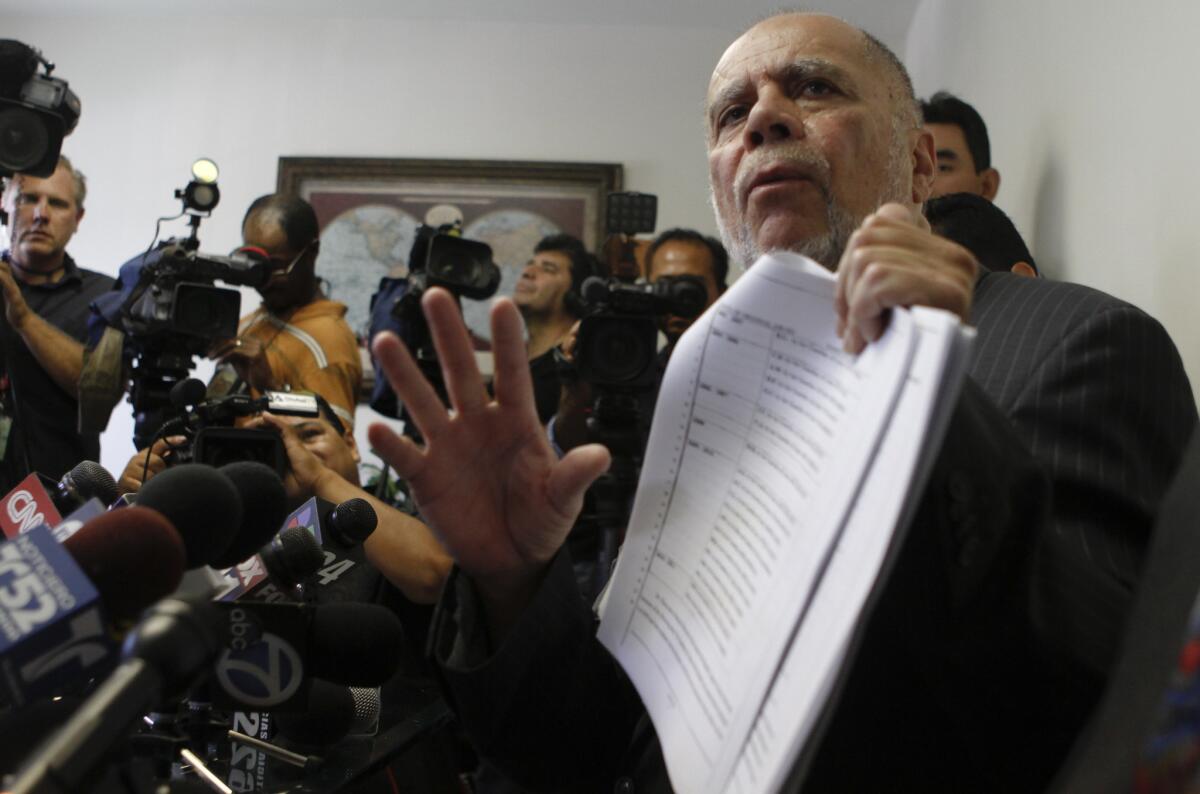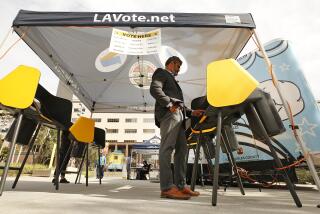Judge orders lawyer to jail for contempt of court in L.A. Unified case

Attorney Luis A. Carrillo, shown at a 2012 news conference, was ordered to spend a day in jail.
A prominent civil rights attorney known for suing the Los Angeles Unified School District on behalf of students who allege they were sexually abused was found in contempt of court Wednesday and ordered to spend a day in jail after a judge concluded he interfered with the mental health examination of one of his young clients.
Attorney Luis Carrillo, who has frequently clashed with the district and represented more than two dozen students in the Miramonte Elementary abuse case, was found to have willfully disobeyed a court order by attempting to limit the questioning done by a psychiatrist hired by the district to examine a 15-year-old girl.
The lawsuit he filed on her behalf alleges that in 2012, when the girl was 13, she was attacked and sexually assaulted by an unknown assailant inside a girl’s bathroom at 95th Street Elementary School in South Los Angeles. The lawsuit argues that the district was negligent in its duty to protect students on campus. The district denies being negligent.
Months before the girl’s examination, Carrillo asked the court to bar a psychiatrist from asking her about the alleged attack, arguing that reliving the incident would bring undue stress and further traumatize her. The psychiatrist, he argued, could avoid questioning her and still learn about her account of what happened by reading transcripts from her previous interviews, including a deposition she gave in the lawsuit.
Los Angeles County Superior Court Judge William Barry rejected Carrillo’s request.
On Wednesday, psychiatrist Dr. Mohan Nair, who was hired by the district to examine the girl, testified that just prior to the July session Carrillo repeatedly admonished him in the lobby of Nair’s office in front of the girl and her mother. Carrillo, Nair testified, told him he should not question the girl because doing so would “retraumatize her” and cause her to cry uncontrollably.
Nair proceeded with the exam and said that the girl was cooperative until he questioned her on the assault.
“The moment I asked her, on a cue, she started crying, stopped answering the questions and that was pretty much the end of it,” Nair said in court. “She completely stonewalled me and was evasive.”
Attorney John M. Coleman, who represents the district, told the judge that Carrillo’s actions were an attack on the court’s authority and were an effort to sabotage the district’s only chance of completing a proper mental health exam of the girl.
“That was a direct attack on our system,” he said. “They’re undermining the fabric of our society and the judicial authority of the court.”
During his ruling, Barry said it was clear that Carrillo ignored his order and inappropriately sought to influence the scope of the examination. Doing so, the judge said, was a “flagrant violation of the court’s order.”
A day has yet to be set for Carrillo to surrender to serve his one day in jail.
Outside court, Carrillo said he did not regret his actions and accused the district of using the mental health exam as a way to bully and intimidate his client.
“I will continue to fight the school district’s underhanded, dirty tactics that cause this kind of trauma,” he said. “This is par for the course but it’s taken a new turn.... Not only are they traumatizing kids who file lawsuits against them, but now they’re going after the lawyers.”
The girl’s mother said she was thankful Carrillo tried to shield her daughter from harm.
“Kids need to be protected,” she said. “Someone needs to stand up for them.”
Carrillo was one of several lawyers who represented students in lawsuits alleging abuse by former Miramonte Elementary School teacher Mark Berndt. Berndt was arrested in 2012 and later pleaded no contest to 23 charges of lewd conduct. He was sentenced to 25 years in prison.
The district eventually settled the lawsuits for more than $170 million.
For more Los Angeles court news, follow @sjceasar.
More to Read
Sign up for Essential California
The most important California stories and recommendations in your inbox every morning.
You may occasionally receive promotional content from the Los Angeles Times.











